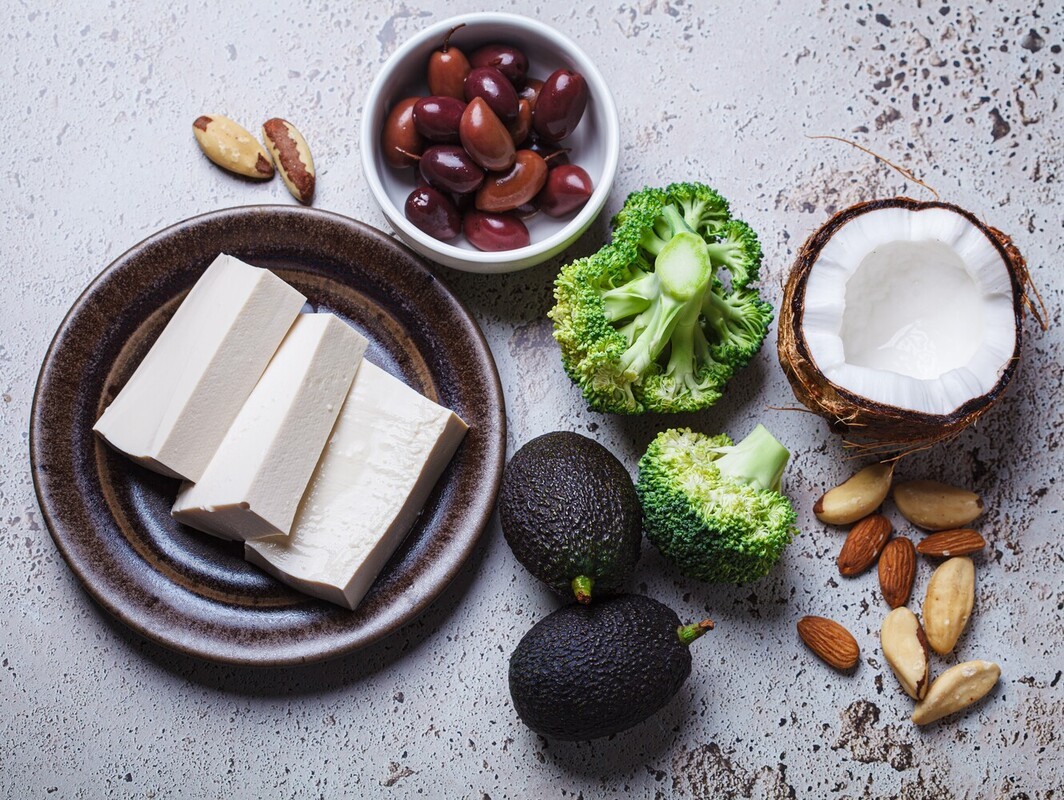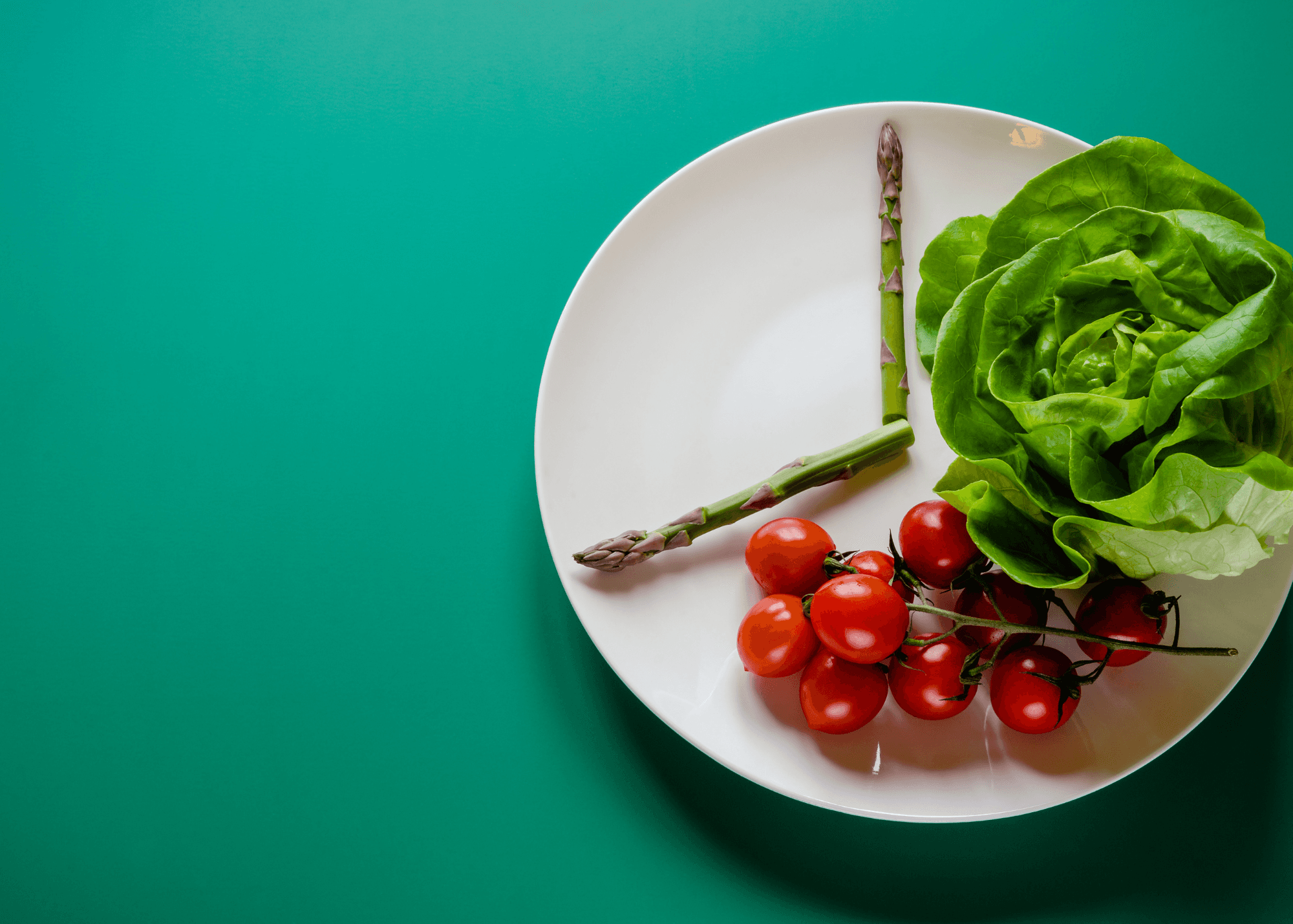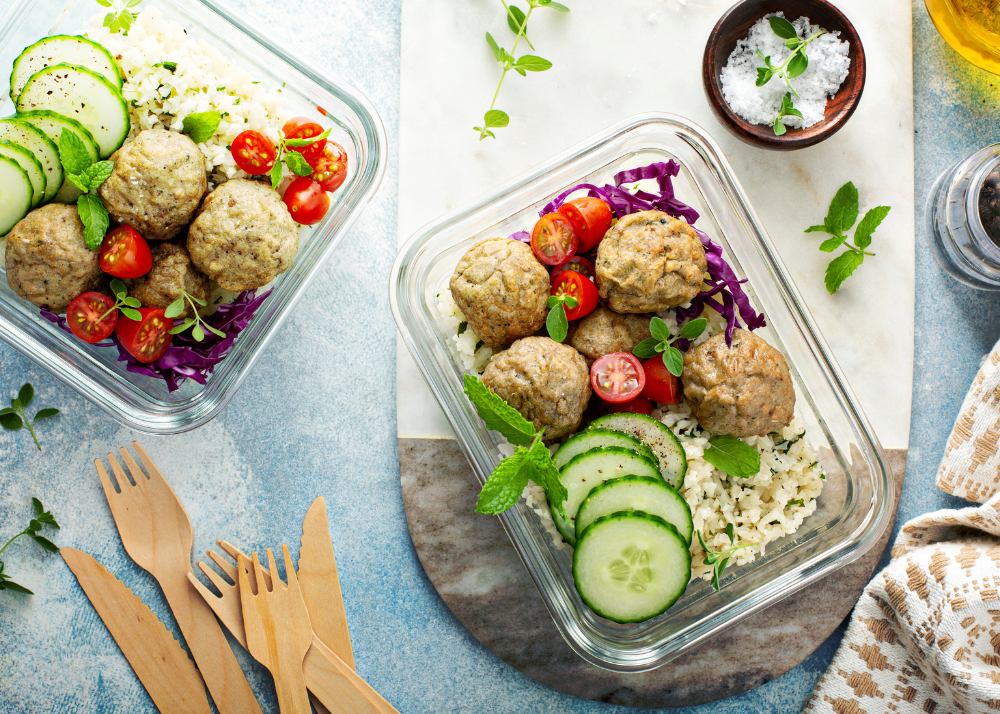The goal of a low-cholesterol diet plan is to incorporate items that reduce cholesterol in your daily routine. Fruits, vegetables, whole grains, and plant-based proteins are some examples of foods that are low in cholesterol.
By following a low cholesterol diet meal plan curated by a Registered Dietitian, you can significantly reduce plaque buildup in your arteries and lower the risk of heart disease.
In this article, we at Berry Street will explore a 3-day low-cholesterol meal plan, discuss the causes of high cholesterol, highlight the benefits of a low-cholesterol diet, and provide actionable tips for success.
Let’s dive in!
3-Day Low-Cholesterol Meal Plan For Beginners
A low-cholesterol diet can be both delicious and effective.
According to a cardiovascular dietitian on our team, this 3-day beginner-friendly meal plan isn’t heart-healthy but also easy to prepare.
It features delicious recipes to save you time while lowering your cholesterol levels and maximizing your nutrition intake.
Day 1
Breakfast: Oatmeal With Raspberries, Nuts, And Chia Seeds (264 Calories)
Start your first day of a heart-healthy diet plan for beginners right with this wholesome Oatmeal With Raspberries, Nuts, And Chia Seeds for a deliciously satisfying low-cholesterol breakfast.
Ingredients:
½ cup dry old-fashioned rolled oats
1 cup water
¼ cup raspberries
1 tbsp chopped nuts (pecans, walnuts or almonds)
1 tbsp chia seeds
Prepare the oats with water according to package instructions. When they’re finished cooking, top the oats with fresh raspberries, crunchy nuts, and chia seeds. Lastly, serve it warm and savor this fiber-rich, heart-healthy breakfast right away.
According to the Mayo Clinic, oatmeal is packed with soluble fiber, which can reduce Low-Density Lipoprotein (LDL) cholesterol while providing a sweet, natural start to your day.

A.M. Snack: Greek Yogurt With Blackberries (141 Calories)
Enjoy a creamy and refreshing Greek Yogurt With Blackberries snack that’s protein-packed and antioxidant-rich.
Ingredients:
1 container (5.3-oz) non-fat Greek yogurt
½ cup blackberries
Scoop the Greek yogurt into a bowl and top with the blackberries. The yogurt provides a high-protein, non-fat option to keep you full, while the blackberries in turn offer antioxidants to support heart health.
Lunch: Cucumber And Roasted Red Pepper Hummus Wrap (394 Calories)
Enjoy this fresh and easy to make Cucumber And Roasted Red Pepper Hummus Wrap and transform your lunch hour.
Ingredients:
1 whole-wheat tortilla (8 inches)
¼ cup roasted red pepper hummus
1 mini sliced cucumber
½ cup mixed greens or spinach
Spread the hummus on the tortilla, then layer it with the cucumber slices, greens and hummus. Roll the tortillas carefully so nothing slips out, then slice them in half. Serve them up right away for a simple and satisfying lunch. Add on grilled or rotisserie chicken for extra lean protein.
This wrap delivers heart-healthy fats, fiber, antioxidants, and essential nutrients while the clementine adds a touch of natural sweetness and vitamin C.
A cardiac dietitian or dietitian specializing in diabetes can incorporate this recipe into nutritious meal plans to support your heart health and stabilize blood sugar levels.
P.M. Snack: 1 Apple (95 Calories)
A medium apple offers the perfect combination of crunch and natural sweetness for this afternoon snack. Harvard Health asserts that apples are rich in pectin, a soluble fiber that helps lower your LDL cholesterol. Our Registered Dietitians suggest pairing with a side of walnuts for omega-3 fatty acids which also help lower cholesterol, reduce inflammation and make this snack more satisfying.
Dinner: Quick Sheet-Pan Salmon With Crispy Quinoa (600 Calories)
End your day with a savory salmon dish paired with crispy quinoa and roasted tomatoes.
Ingredients:
1½ cups precooked, microwaveable white and red quinoa
5 tbsp divided extra-virgin olive oil
3 cups cherry tomatoes
3 tbsp drained nonpareil capers
2 tbsp balsamic vinegar
¼ tsp ground pepper
4 (5 oz) salmon filets with skin on
3/4 tsp divided salt
¼ cup torn and fresh basil leaves
½ tsp refrigerated garlic paste
½ tsp red-wine vinegar

Preheat the oven to 425°F and line two baking sheets with parchment. Spread the quinoa on one sheet, drizzle with oil, and toss around. On the second sheet, arrange the tomatoes around the salmon fillets, then drizzle them with oil and seasoning.
Bake the quinoa and salmon on separate racks for 15 minutes, until the salmon is cooked and the tomatoes burst, then fluff the quinoa with a fork and season.
Plate the salmon and quinoa, then top both with the tomatoes tossed with basil, garlic paste, and red-wine vinegar. Serve warm and enjoy this flavorful, protein-rich dish.
Salmon is an excellent source of omega-3 fatty acids. It lowers triglycerides, fats found in your blood, and improves heart health.
Drawing from our experience, this Quick Sheet-Pan Salmon With Crispy Quinoa dish is a favorite option, and with a few adjustments can be a great option for a free keto diet meal plan.
Ready to take control of your heart health with Berry Street?
Use our online Registered Dietitian services today to create your personalized low-cholesterol meal plan and achieve your wellness goals effortlessly!
Day 2
Breakfast: Sprouted-Grain Toast with Peanut Butter And Banana (290 Calories)
Start your morning with a nutrient-packed toast that’s perfect for a quick, low-cholesterol breakfast.
Ingredients:
1 slice sprouted-grain bread
1 tbsp peanut butter
1 medium sliced banana
Toast the bread, then top it with peanut butter as well as the banana slices.
Based on our first-hand experience, this Sprouted-Grain Toast with Peanut Butter And Banana provides whole-grain goodness with minimal processing, offering you protein, fiber, and natural sweetness.
A.M. Snack: Edamame (180 Calories)
A cup of steamed edamame is the perfect mid-morning snack to keep you energized.
Take a cup of edamame and steam it in a pot of boiling water for several minutes. Next, drain it and place it on a plate, then sprinkle lightly with sea salt if desired.
Edamame is rich in plant-based protein and fiber, which support heart health and lower your LDL cholesterol levels.

Lunch: 20-Minute White Bean Soup (352 calories)
Warm up with this hearty, white bean soup packed with delectable flavors, fiber, and antioxidants to support heart health.
Ingredients:
4 cups reduced-sodium vegetable broth
2 cups thawed and chopped sweet potatoes
2 cups thawed and chopped collard greens
2 (15 oz) cans rinsed, no-salt-added cannellini beans
1 medium chopped yellow onion
3 medium finely chopped celery stalks
2 tbsp lemon juice
6 medium cloves finely chopped garlic
1 tsp salt-free garlic-and-herb seasoning
½ tsp salt
¼ tsp ground pepper
¼ tsp crushed red pepper
¼ cup heavy cream
¼ cup grated Parmesan cheese
Gather all the ingredients and simmer them in a Dutch oven for 20 minutes or so. Finally, scoop some into a bowl, stir in the cream, and serve topped with Parmesan.
Our findings show that this 20-Minute White Bean Soup is an outstanding example of the Mediterranean diet as well as a low-cholesterol option.
It offers soluble fiber and antioxidants that help lower your cholesterol and reduce inflammation.
P.M. Snack: Bell Pepper And Hummus (115 Calories)
This crunchy, colorful Bell Pepper And Hummus snack is as delicious as it’s heart-healthy.
Ingredients:
1 medium sliced bell pepper
3 tbsp hummus
Prepare the bell pepper by slicing it, then dip it into some hummus and enjoy right away. Bell peppers are high in vitamins and antioxidants, while the hummus provides plant-based protein and healthy fats.

Dinner: Anti-Inflammatory Chicken And Beet Salad (375 Calories)
End your day on a high note with this vibrant and nutritious Anti-Inflammatory Chicken And Beet Salad.
Ingredients:
¼ cup extra-virgin olive oil
2 tbsp tart cherry juice concentrate
1 tbsp white balsamic vinegar
1 tsp salt
¼ tsp ground pepper
¼ tsp grated lime zest
1 (5 oz) package spring mix salad greens
2½ cups (10 oz) chopped or shredded cooked chicken breast
1 package (8 os) quartered and cooked beets
¾ cup shaved Brussels sprouts
½ cup crumbled goat cheese
¼ cup chopped and toasted walnuts
Toss the salad ingredients in a large bowl and serve immediately.
Through our practical knowledge, we found that the beets and the walnuts are anti-inflammatory and support healthy blood flow, while the chicken and Brussels sprouts provide you with lean protein and fiber.
This meal is a perfect blend of heart-friendly nutrients, which can be incorporated into a customizable meal plan by a heart health dietitian.
Day 3
Breakfast: Oatmeal With Raspberries, Nuts, And Chia Seeds (264 Calories)
Revisit the first day of your low-cholesterol meal plan with this warm, fiber-packed bowl of oatmeal, topped with raspberries, nuts and chia seeds.
It can even form part of numerous diet plans for diabetics, as well.
A.M. Snack: Greek Yogurt With Blackberries (141 Calories)
This creamy Greek yogurt and antioxidant-rich blackberries make for a refreshing and protein-rich mid-morning snack.
Lunch: Leftover 20-Minute White Bean Soup Plus 1 Apple (352 Calories)
Enjoy some leftover white bean soup, which becomes even more flavorful the next day. You can pair it with a crisp apple for added fiber and natural sweetness.

P.M. Snack: Banana And Almonds (311 Calories)
A banana and a handful of almonds provide the perfect balance of natural carbs, healthy fats, and protein for sustained energy.
You can even incorporate this snack into a low carb diet plan, as well.
Dinner: Leftover Quick Sheet-Pan Salmon With Crispy Quinoa (600 Calories)
Round out the day with some leftover salmon and crispy quinoa, a dish packed with omega-3s, protein, and heart-friendly nutrients.
At Berry Street, we make healthy eating effortless with our Registered Dietitian online services. Contact us now to help you create a tailored low-cholesterol meal plan!
What Causes High Cholesterol?
High cholesterol stems from various factors, including:
poor diet
genetics
lack of exercise
smoking
high stress levels
In this instance, consuming things with saturated fats, trans fats, and cholesterol-rich foods can elevate your LDL (known as "bad" cholesterol) levels.
Our investigation demonstrated that lifestyle adjustments can boost your High Density Lipoprotein (HDL) cholesterol, or "good" cholesterol.

Conclusion
In this article, we revealed that a beginner-friendly 3-day meal plan within a low cholesterol diet plan is a proven way to lower LDL levels, reduce heart disease risk, and improve overall wellness.
Ready to take the next step?
At Berry Street, our Registered Dietitians can customize a plan that’s perfect for you. Book your consultation today and start your journey toward better health!












